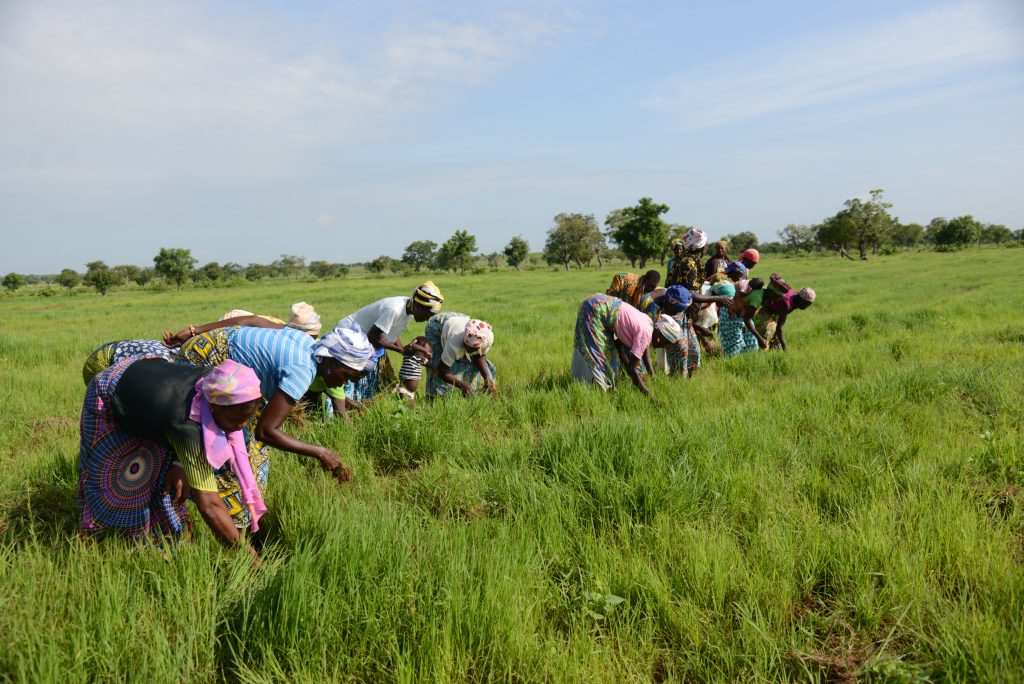By Akua Mensah, Communication Specialist
In many rural areas in northern Ghana, two key issues intersect.
Nearly 35 percent 1 of land in Ghana is under threat of desertification, with much of this land located in the northern part of the country. In these areas, households depend heavily on agriculture for their livelihoods. Thus, land desertification and degradation pose real threats to food security and financial stability.
At the same time, patriarchal customs deny women land ownership. Land inheritance is patrilineal—men own land, while women can only work on it.
Put these issues together, and women and women-led households in this region are severely limited in food production and income generation. Trade Hub partner, AMAATI Company Ltd (AMAATI), led by CEO Salma Abdulai, set out to address the issue of women’s marginalization through empowering women who do not own land in northern Ghana. Established in 2014, AMAATI pioneered the revival of the cultivation of fonio, a drought-resistant crop that also regenerates degraded soil.
Through USAID/Ghana, the Trade Hub awarded AMAATI a $742,000 co-investment grant to develop a 1,000-acre nucleus farm in Mion District in the Northern Region and to support 6,000 women farmers in fonio production. Other objectives of the project were to help the company secure $4.5 million in private investments to modernize their factory and generate $4.6 million in exports to the United States and Europe.

With operations primarily in Chereponi, a USAID Zone of Influence in the North East region, AMAATI negotiates with local chiefs to lease abandoned or degraded land under the company’s name. The company registers and trains women farmers, who are then allotted plots to cultivate fonio. Prior to AMAATI’s program, these women would typically have only been given one or two acres of their fathers’ or husbands’ farms on which to cultivate subsistence crops. With AMAATI’s intervention, they can lay claim to an additional one to three acres on which to cultivate a burgeoning export crop.
To protect their incomes, AMAATI pre-finances the farmers’ seeds and ensures a buy-back of 80 percent of the fonio produced, while encouraging them to retain 20 percent for their own households. This buy-back arrangement guarantees year-round financial stability and food security for these female farmers. Additionally, as fonio has become more of a household staple due to the bags the farmers keep for their households, many of the women’s husbands have also begun cultivating fonio on their own farms, and the preference for the crop has become more established in the region. This helps to ensure continuing demand year-round.
From its inception, AMAATI has put the welfare of women at the forefront of its operations. Co-founded and led by a woman CEO, they also ensure that women are represented in leadership throughout the organization. 75 percent of AMAATI’s workforce (factory and administrative) is made up of women, and female farmers comprise approximately 80 percent of their outgrowers. To date, AMAATI has successfully onboarded 5,508 women farmers (91 percent of their target) to their fonio outgrower program. The women farmers use their proceeds from their buy-back agreement with AMAATI to repair their homes, set up small businesses planting other crops or selling provisions, and even to save towards paying for their personal tertiary education fees.
In the future, AMAATI seeks to encourage more of their outgrowers to open bank accounts and plans to work with financial institutions to establish arrangements for the farmers to repay future loans on a schedule that coincides with their fonio sales. This would allow their women farmers more financial independence and the capacity to fully participate in the local economy.
AMAATI’s work in providing a pathway to economic inclusion for women is invaluable in the bid to support women in the smallholder agricultural economy. Given access to the necessary resources, women would be able to substantially reduce the nation’s food insecurity and import dependence, as AMAATI successfully demonstrates. Working with women who are disenfranchised from land ownership, on plots that would otherwise be abandoned, AMAATI is not only restoring agricultural land, but also the livelihoods of these women and their families.

